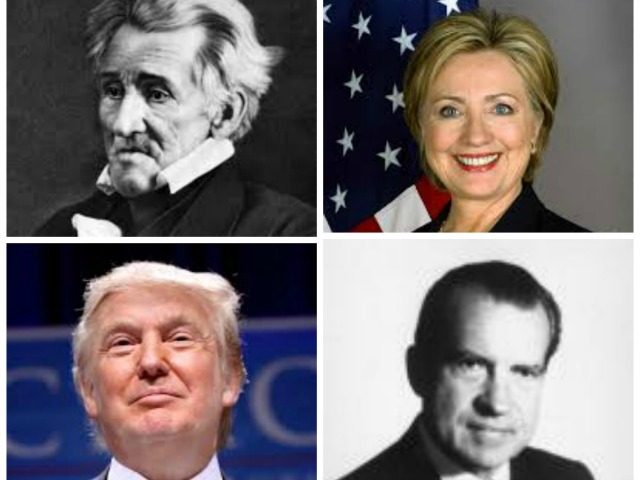Political pundits say this campaign is like no other — but we have seen this before.
One Presidential candidate shocked polite society and the chattering class as he successfully campaigned as the underdog against a “rigged” system.
One scandal-plagued disregarded his part of his party’s base, appealed to the other party’s voters, and won a landslide personal victory that failed to produce coattails.
You can substitute “Donald Trump,” for “Andrew Jackson” in the history of a candidate winning against huge odds, and then sub “Hillary Clinton” for “Richard Nixon” in the account of a scandal-plagued candidate who won a landslide victory without winning either chamber of Congress.
Right now the polls fall between the two — a smaller Clinton win — but the final push could lead this campaign to follow one of two similar historic paths.
If you substitute “Trump” for “Jackson” in the Miller Center’s review of the election of 1824, the campaign looks very similar:
Crawford’s [Jeb Bush’s] … consequent image as the insider’s choice rather harmed than helped his chances. … Many political professionals, especially [Speaker Henry] Clay, did not take Jackson’s [Trump’s] candidacy entirely seriously at first. The returns showed their mistake. He proved to be the only aspirant with a truly national popular following. He led the field with 43% of the popular vote and 99 electoral votes, less than a majority. Adams ran second, with 84 electoral votes … the choice between the top three now fell to the House of Representatives. Speaker Clay … announced his support for Adams, warning that Jackson was … unfit by training or temperament for the presidency … Jackson [Trump] swore that a “corrupt bargain” had swindled him out of the office. Promptly he began to gird for a rematch in 1828. [Which he easily won].
Hillary Clinton as Nixon, based on excerpts from the PBS documentary on Nixon’s re-election campaign.
Months after the Watergate break-in [email and foundation scandals], a triumphant Nixon [Hillary Clinton] took command at the Republican [Democratic] National Convention … Nixon [Clinton ]now wanted to win the biggest landslide in presidential history … Nixon’s [Clinton’s] campaign amassed huge sums of money. Skillful television ads appealed to [members of the opposing party]. Nixon [Clinton] had always campaigned hard for other Republicans [Democrats]. Now he [she] abandoned them, even dropped the party label. Richard Nixon campaigned as “the President.”
As Nixon [Clinton] pursued victory, the White House continued to deny involvement in Watergate [scandals]. A few reporters followed the story, but most voters dismissed the break-in [scandals] as a campaign caper … Watergate [scandals] never threatened Nixon’s [Clinton’s] big win. Nixon [Clinton] overwhelmed his [her] rival, but his [her] victory was not complete. The Democratic [Republican] opposition retained control of both the House and the Senate.
DAVID S. BRODER, Reporter, The Washington Post: It turned out to be a lonely landslide. He monopolized all of the resources, all of the money, all of the political talent in the Republican Party and anything else that he could annex for his own personal victory and didn’t share the wealth and the opportunity with his party. It was an extraordinarily selfish victory, in my view.
“I’m at a loss to explain the melancholy that settled over me on that victorious night,” Nixon later wrote. “To some extent, the marring effects of Watergate may have played a part, to some extent, our failure to win Congress and to a greater extent, the fact that we had not been able to win the war in Vietnam [against ISIS].”
With all the variables in campaigns, Trump is a wild card who could go much higher or much lower than the 206-332 electoral loss Moody’s model predicts a typical Republican nominee would suffer. Mitt Romney was a “safe” nominee and even at his peak never had more than a 42 percent chance of winning according to Nate Silver, and by Election Eve was given only a 9.1 percent chance of winning and projected 225 electoral votes – and he missed even that.
The Trump nomination is a gamble — choosing not to follow the “respectable loss model” and instead risk a Nixon-like loss to Clinton or pull a big upset like Andrew Jackson. If the goal was to ensure 206 electoral votes — something like running a quarterback sneak from the opponents’ 20-yard line when trailing on the last play of the game to avoid a chance at an embarrassing interception — then Trump was not the choice.
If it was worthwhile to take a shot at a surprise 270 score while admittedly risking dropping well below 200 — then Trump is offering a much greater chance to be blown out or to win.

COMMENTS
Please let us know if you're having issues with commenting.